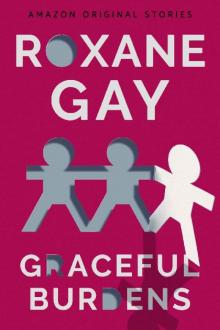- Home
- Roxane Gay
Hunger Page 7
Hunger Read online
Page 7
When I got home at night, I generally went straight to my computer, where I wrote story after story, mostly about women and their hurt because it was the only way I could think of to bleed out all the hurt I was feeling. I frequented newsgroups and chat rooms for survivors of sexual assault. Though I couldn’t tell anyone in my real life what had happened, I unburdened myself to strangers on the Internet. I blogged, mostly about the minutiae of my life, hoping, I think, to be seen and heard. I loved and craved the freedom of being online and being free from my life and my body. I ate and ate and ate but rarely was any of the food I ate memorable for any reason but the quantity. I ate mindlessly, just to fill the gaping wound of me or to try to fill the gaping wound of me. No matter how much I ate, I still hurt and I was still terrified of other people and the memories I couldn’t escape. I managed to put together a collection of short stories for my thesis, entitled How Small the World, and successfully defended my thesis and then I was done with school and I had no idea what to do so I got a job working at the university as a writer for the College of Engineering. I tried to do what was expected of me. Some days, I tried really hard.
28
As I spent more time working at the College of Engineering, I realized that when I had dreamed of making a living as a writer, I probably should have been more specific about what, exactly, I meant by that. And still, every day I got to write. I had my own office and a computer on which I could play solitaire and work on my own writing. I mostly wrote articles about faculty research—things that I knew nothing about and that the faculty were more than eager to explain to me—on robotic construction equipment, aerogels that could be used in space, defenses against bioterrorism, innovative uses for RFID chips.
The job was fine, by far the best job I had ever had, making the most money I had ever made even though I was not making much money at all. I had a great, encouraging supervisor named Constance, who made me a much better writer. I learned how to use the Adobe Creative Suite. I worked with undergraduate engineering students as the adviser of their magazine.
And still, I would sit in professors’ offices listening to them talk about their research and think, I could totally do what they do. Certainly, that was a bit grandiose, but I was working ten-hour days, always at someone else’s whim. I envied the freedom faculty seemed to have, teaching two or three times a week, setting their own schedules and being handsomely compensated. I wanted to live that life. Throughout my MA program, I had always intended to get my PhD, but I was going to get my PhD in creative writing and write my great Haitian American novel and get a teaching job and be set for life.
And then, as one of my work duties, I went to the annual conference for the National Society of Black Engineers to man a recruitment table for the College of Engineering. The woman whose table was across the aisle from mine throughout the conference, Betty, began talking to me about the school she worked for, Michigan Technological University, and how they had a great technical communication program. I had never heard of Michigan Tech, and was certain that I’d be staying at UNL. After the conference, though, she stayed in touch and she was persistent. Then the woman I thought I was in a relationship with broke up with me, on Valentine’s Day, via e-mail, and suddenly, I wanted to be as far away from Lincoln as possible. I applied to Michigan Tech, was accepted, and they made me an offer I could not refuse—enough money to nearly match my salary, teaching opportunities, tuition remission, and terrible health insurance. That summer, I moved to Hancock, Michigan, sight unseen, to attend a doctoral program at a school I had never heard of in a field I knew nothing about. My brother Michael Jr. transferred to Michigan Tech and joined me. As we drove into town, we both realized that we had no idea what we were getting ourselves into. The Upper Peninsula was so very remote. The two-lane country highways we took for hours were dwarfed by trees thick with leaves. There were deer everywhere as the sun set, so we slowed to a crawl. When I met my landlord, who lived in the upstairs unit of an old building where she and her deceased husband had run a dry cleaner, she stood behind her latched screen door as my brother and I stood on the porch. She peered out at me and said, “You didn’t sound like a colored girl on the phone.” I was thirty years old.
29
There was something comforting about graduate school and living a life of the mind. My body didn’t matter because I was in school, taking classes and learning things. I was learning how to teach on the job. I had very specific responsibilities that demanded nearly all of my focus, my time and energy.
But I couldn’t forget my body. I could not escape it. I didn’t know how, and the world was always there to remind me.
On my first day of teaching, a Monday, I threw up before class because I was terrified, though not of the teaching itself. I would be teaching freshman composition, and while managing a classroom is always a challenge, I felt comfortable imparting onto my students the basics of writing persuasively. What I feared was my appearance and what they would think of me. I worried that if they didn’t like me, they would make fun of me, mocking my weight, and I was not at all sure how to make them like me when I felt so very unlikable, and always had. I worried about stamina and whether I would be able to stand for fifty minutes. I worried about sweating in front of them and how they would judge me for it. I worried about what to wear, because my standard uniform of jeans and T-shirts was too casual and what little dressy clothing I did have would have been way too dressy for the classroom.
The good thing about school is that students have been trained, from an early age, to follow the rules. They come to class and generally sit and behave in an orderly fashion. When you tell them to do things, they do those things. I walked into my first classroom, my heart pounding, sweating everywhere, my head ringing with all of my fears and insecurities. I was carrying a big box of Legos because I figured, if nothing else, the students might enjoy playing with toys. At first, they didn’t seem to realize I was their teacher, and I was not sure if they were unsure because of my size, my race, or what I vainly hoped was my youthful appearance. When I stood at the front of the classroom, they hushed, and realized I was the teacher. I took attendance, my legs rubbery with anxiety, and then went into discussing the syllabus, the nature of the class and what would be expected of them—regular attendance, active participation, homework turned in on time, no plagiarism and the like. It was reassuring to have these administrative details to go over with the students, but when I was done discussing the syllabus, I actually had to teach and my anxiety rushed right back through me.
At the end of that first class, as the students filed out of the room, I wanted to collapse with relief because I had survived those fifty minutes of being fat in front of twenty-two eighteen- and nineteen-year-olds. And then I realized I was going to have to do it all over again, on Wednesday and Friday, week in and week out for the entire semester.
I went to my classes. I taught. I studied. I tried to make friends and did, with a small measure of success. On weekends, I played poker at a casino in Baraga, the Ojibwe reservation about forty miles away, hunched around the table with strange men, where I was intent on taking their money, which often I did. I still didn’t sleep much. I kept eating, trying to find some kind of peace.
And then, one day, I was walking home from the gas station across the street, where I had gone to buy cigarettes. I wore a knit cap on my head, a ratty T-shirt, and pajama pants. I looked terrible, but no one at the Citgo cared. I didn’t care, either. A man started calling after me, shouting, “Hey, Casino Girl,” which only made me want to run. I assumed that he was going to make fun of me because I had long become accustomed to people, men mostly, calling out cruelties from their cars, their bicycles, when they walked on by—letting me know exactly what they thought of my body.
This was not that. He followed me to my apartment and up the stairs, so I quickly closed the screen door, latched it, and stared out at him. “You play poker at the casino,” he said, and I nodded, reluctantly. I tried to place him but
couldn’t. He looked like every other white guy I saw around town—dark, shaggy hair, a beard, wearing flannel and denim and work boots. “You’re always talking shit at the poker table. Do you wanna come hang out with me and my friends?” He pointed toward the distance. “Absolutely not,” I told him, wanting him to go away, but he was mighty persistent. I was unsure what he wanted from me, but I knew it couldn’t be anything good. Maybe he wanted me to go meet his friends so they could hurt me. Maybe he wanted money. I ran through the possibilities as he kept yammering on. Finally he said he needed to get back to his friends, and I closed my door, unsettled. I couldn’t sleep that night, staring at the ceiling, worrying about the strange man who followed me home.
He kept coming back, night after night, and would always knock, then stand on my porch when I finally came to the door, talking to me through the screen, never trying to come inside. Eventually it dawned on me that he was trying to ask me out. We went out to dinner at the nearby Ramada, which had a lousy restaurant but a good bar. His name was Jon. He was a logger. He loved to hunt and fish. He loved Lakers basketball. He had never lived anywhere but Michigan’s Upper Peninsula.
I was always skeptical of his attention, always waiting for him to reveal his true, cruel self, but day after day and week after week, he was good to me. He was solid. He ignored my casual barbs and resisted any and all attempts to push him away. He drank too much, but he was a happy drunk, the kind to laugh at his own jokes and fall asleep with a smile on his face. I quit smoking because I was getting older and realized I had been smoking for eighteen years and that I had to at least try to love myself enough to give up one of my terrible but beloved habits.
I was online all the time, starting to blog for websites like HTMLGiant and The Rumpus. I discovered social networking. I started sending my writing out into the world again. Jon called anyone I knew online one of my “little friends in the computer.” Some weekends, he would take me to his camp, the Upper Peninsula version of a remote lake cabin. There was no Internet up there and barely any cell phone service. I had to disconnect from the safety of the virtual world and be present in the real world, with him. He was the first man who touched me with any kind of gentleness, even when I asked him not to. He loved me and, over time, I realized I loved him too. We had a good relationship, one with more ups than downs.
And then I came to the end of my doctoral program. I got a job teaching at Eastern Illinois University. I was starting to make a name for myself as a writer. I had every reason to feel hopeful. Jon and I had countless conversations about what we would do. He wanted me to stay. A part of me wanted to do it, to just settle down and become a logger’s wife. But a bigger part of me wanted him to follow me because I had worked so hard for five years. I had accomplished something not many people, and even fewer black women, accomplish. I wanted to believe in our love story. I waited for him to make the grand gesture I wanted and needed from him. I wanted to believe I was worthy of that grand gesture.
Jon and I had no dramatic arguments as we faced the end of my time in the UP. After I graduated, he helped me move to Illinois. We went to IKEA and shopped for furniture. He assembled bookshelves and a coffee table and checked the locks on the doors in my new apartment. We said good-bye in a hundred different ways without actually saying “Good-bye.” Jon’s eyes were red when he headed back home. So were mine. We stayed in touch, and for a time, there was a genuine yearning between us for the idea of what we could be. And still, that grand gesture never came. I fell back into the familiar embrace of self-loathing. I blamed myself. I blamed my body.
III
30
I often refer to my twenties as the worst years of my life because that’s exactly what they were. From one year to the next, though, things got better in that I became more functional as an adult. I was able to accumulate degrees and get better jobs. Slowly but surely, I tried to repair my relationship with my parents and redeem myself in their eyes. In the before I had been a good girl, so I knew how to play that role. Some part of me was still willing to play that role after my lost year in Arizona so that, despite my desperate loneliness, I might still be connected to something—work, writing, family.
But.
During my twenties, my personal life was an unending disaster. I did not meet many people who treated me with any kind of kindness or respect. I was a lightning rod for indifference, disdain, and outright aggression, and I tolerated all of this because I knew I didn’t deserve any better, not after how I had been ruined and not after how I continued to ruin my body.
My friendships, and I use that term loosely, were fleeting and fragile and often painful, with people who generally wanted something from me and were gone as soon as they got that something. I was so lonely I was willing to tolerate these relationships. The faint resemblance of human connection was enough. It had to be enough even though it wasn’t.
Food was the only place of solace. Alone, in my apartment, I could soothe myself with food. Food didn’t judge me or demand anything from me. When I ate, I did not have to be anything but myself. And so I gained a hundred pounds and then another hundred and then another hundred.
In some ways, it feels like the weight just appeared on my body one day. I was a size 8 and then I was a size 16 and then I was a size 28 and then I was a size 42.
In other ways, I was intimately aware of every single pound that accumulated and clung to my body. And everyone around me was also intimately aware. My family’s concern became a constant chorus of nagging, always well intended, but mostly a reminder of how I was a failure in the most basic of my human responsibilities—maintaining my body. They were relentless in asking me what I was going to do about my “problem.” They offered advice. They tried tough love. They offered to send me to specialists and spas. They offered financial incentives and new wardrobes and new cars. There is nothing they would not have done to help me solve the problem of my body.
They mean well, my parents. They love me. They understand the world as it is, and how there is no room for people of my size. They know that the older I get, the harder it will become to live at this size. They worry about my health and my happiness. They are good parents. My parents also want to understand—they are intellectual, smart, practical. They want my weight to be a problem they can address with the intellect they apply to other problems. They want to understand how I could have let this happen, let my body become so big, so out of control. We have that in common.
And still. They are my personal Obesity Crisis Intervention team. They have been actively pursuing the problem of my body since I was fourteen years old. I love them so I accept this, sometimes with grace and sometimes without. It is only now, in my early forties, that I have started to put my foot down and say, when they try to broach the conversation of my body, “No. I will not discuss my body with you. No. My body, how I move it, how I nourish it, is not your business.”
There was a time when every conversation included some kind of question about my weight. My parents, and my father in particular, make inquiries as to whether I am dieting, exercising, and/or losing weight as if all I am is my big fat body. But they love me. This is what I remind myself so I can forgive them.
My father is the more passionate one in this crusade. Over the years, he has gifted me weight-loss programs and books on weight loss, particularly those endorsed by Oprah. One year, it was Richard Simmons’s Deal-a-Meal. He has sent me brochures. He has told me to take time off from school because “all those degrees you’re getting aren’t going to do you any good, because no one is going to hire you at your size.” He has told me, “I am only telling you what no one else will,” but of course, he is telling me what the world is always telling me, everywhere I go. When he hears of a new weight-loss drug or program on the radio, on TV, at the airport, anywhere, he is quick to call me and ask me if I have heard of what he hopes is the silver bullet solution to the problem of my body. He has so much hope for what I could be if only I could overcome my body. His hope breaks
my heart.
My mother is subtler and she frames her worry primarily around my health. She often discusses the health risks of obesity with me—diabetes, heart attack, stroke. She worries that my caretaking will fall to her if I do succumb to a terrible illness, and that she won’t be up to the task.
My brothers care too, and I know they also worry, but they are my brothers so they don’t pressure me about weight loss. They are my defenders and also my tormentors. They have a song, the “humongous” song. My middle brother loves to serenade me with it. “When I say humongous, humong la laaaaa,” he will screech, and then everyone will laugh because it is oh so funny. It wasn’t funny when I was a teenager and it isn’t funny now, but the song persists. I often become irate when they sing this song. My body is not a joke or fodder for amusement, but, I suppose, to many people, it is.
My family’s constant pressure to lose weight made me stubborn, even though the only person I was really hurting was myself. The constant pressure made me refuse to lose weight to punish these people who claimed to love me but wouldn’t accept me as I was. It became easier to drown out that chorus of concern, to tolerate the horrible ways people treated me, to ignore that I could no longer buy clothes in the mall, or at Lane Bryant, and sometimes not even at Catherines. I became resentful that the only thing anyone ever wanted to focus on was my body, always unruly and disappointing. I shut down completely. I went through the motions. I learned how to tune out my parents, my brothers, people on the street. I learned how to live in my head, where I could ignore the world that refused to accept me, where I could block out the memories of the boys I couldn’t forget, no matter how much time and distance yawned between me and them.

 Graceful Burdens (Out of Line collection)
Graceful Burdens (Out of Line collection) The Best American Short Stories 2018
The Best American Short Stories 2018 Bad Feminist
Bad Feminist Bad Feminist: Essays
Bad Feminist: Essays Ayiti
Ayiti Difficult Women
Difficult Women An Untamed State
An Untamed State Hunger
Hunger